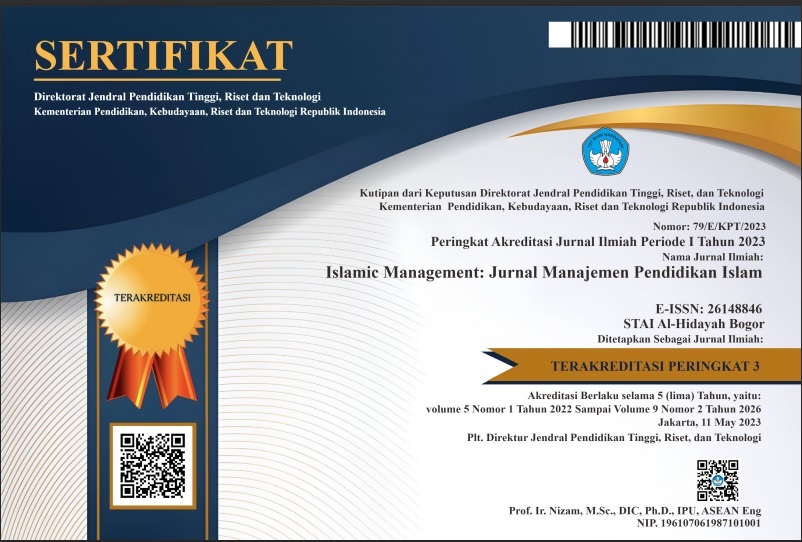HOLISTIC CHARACTER EDUCATION AT KHALAFIYAH ISLAMIC BOARDING SCHOOL: AN INTEGRATIVE APPROACH IN MATHLAUL HUDA CIPARAY ISLAMIC BOARDING SCHOOL
DOI:
https://doi.org/10.30868/im.v8i02.8172Keywords:
Character Education, Islamic Boarding School, Khalafiyah Islamic Boarding School.Abstract
This study aims to analyse the implementation of character education at Pondok Pesantren Mathlaul Huda Ciparay, which combines formal and non-formal curriculum in shaping the character of students. This research uses a qualitative approach with observation methods and in-depth interviews with pesantren administrators and teachers. The results showed that character education at Pondok Pesantren Mathlaul Huda was carried out through the exemplary approach, strengthening moral values, and disciplinary training. The ustadz acts as a model of behaviour that shows discipline and responsibility, which is then imitated by the santri in their daily lives. In addition, special programmes such as Ta'lim wa Tarbiyah and mutual cooperation activities strengthen moral and social values in santri. The influence of this character education can be seen in the social attitudes of santri who are more tolerant, empathetic, and have high social responsibility. In conclusion, an integrated approach that includes moral knowledge, feelings, and actions at Mathlaul Huda Islamic Boarding School has succeeded in shaping the character of students holistically. This research suggests that the character education model in this pesantren can be applied in other educational institutions as an effort to build the character of the younger generation with integrity.
References
Abdurrahman, Nana Herdiana. 2016. “Character education in islamic boarding school-based SMA Amanah.” Jurnal Pendidikan Islam 2 (2): 287–305.
Al-Attas, Syed Muhammad Al-Naquib. 1992. Konsep Pendidikan dalam Islam: Suatu Rangka Pikir Pembinaan Filsafat Pendidikan Islam. IV. Bandung: Mizan.
Anwar, Saeful, dan Rifki Rosyad. 2021. “Pemikiran dan Aplikasi Teologi Lingkungan di Pesantren Cicalengka Kabupaten Bandung.” Jurnal Iman dan Spiritualitas 1 (2). https://doi.org/10.15575/jis.v1i2.11793.
Azizah, Hari Nur, Nicky Estu Putu Muchtar, dan Freddrick Tiagita Putra. 2023. “Pesantren as a Pillar of Islamic Civilization Development in Indonesia.” Academicus: Journal of Teaching and Learning 2 (1): 9–15.
Azyumardi Azra. 1999. Pendidikan Islam: Tradisi dan Modernisasi Menuju Milenium. Yogyakarta: Pustaka Pelajar.
Bandura, Albert. 1986. “Social foundations of thought and action.” Englewood Cliffs, NJ 1986 (23–28): 2.
Bruinessen, Martin Van. 1999. Kitab Kuning: Pesantren dan Tarekat. Bandung: Mizan.
Bubalo, Anthony, dan Greg Fealy. 2007. Jejak kafilah: pengaruh radikalisme timur tengah di Indonesia. Mizan Pustaka.
Creswell, John W. 2014. Research Design: Qualitative, Quantitative and Mixed Methods Approaches. New York: SAGE Publications, Inc.
Daulay, Haidar Putra. 2001. Historisitas dan Eksistensi Pesantren, Pesantren dan Madrasah. Yogyakarta: Tiara Wacana.
Dhofier, Zamakhsyari. 1994. Tradisi Pesantren: Studi Tentang Pandangan Hidup Kiai. Jakarta: LP3ES.
Flick, Uwe. 2009. An Introduction to Qualitative Research. London: Sage Publishing.
Freire, Paulo. 1968. Pedagogy of the Oppressed. New York: Herder and Herder.
Hasan, Noorhaidi. 2022. “Salafism, Education, and Youth.” Wahhabism and the World: Understanding Saudi Arabia’s Global Influence on Islam, 135.
Hefner, Robert W, dan Muhammad Qasim Zaman. 2010. Schooling Islam: The culture and politics of modern Muslim education. Princeton University Press.
Ishaq, M. 2018. “KH. Abdul Wahid Zaini Dan Pengembangan Pondok Pesantren Nurul Jadid Paiton Probolinggo.”.” Tesis Pascasarjana Universitas Islam Negeri Sunan Ampel Surabaya.
Kuhn, Thomas. 2012. The Structure of Scientific Revolutions. Diterjemahkan oleh Tjun Surjaman. Bandung: Rosda.
Langgalung, Hasan. 1986. Manusia dan Pendidikan: Suatu Analisa Psikologi dan Pendidikan. Jakarta: Pustaka al-Husna.
Lickona, Thomas. 2013. Pendidikan Karakter: Panduan Lengkap Mendidik Siswa Menjadi Pintar dan Baik. Bandung: Nusa Media.
Madjid, Nurcholis. 1998. Islam Agama Kemanusiaan. Jakarta: Yayasan Wakaf Paramadina.
Madjid, Nurcholish. 1997. Bilik-Bilik Pesantren: Sebuah Potret Perjalanan. Jakarta: Paramadina.
Masruri, M, Hapzi Ali, dan Kemas Imron Rosadi. 2021. “Pengelolaan Keuangan Dalam Mempertahankan Kualitas Pondok Pesantren Selama Pandemi Covid-19.” Jurnal Ilmu Manajemen Terapan 2 (5): 644–57.
Mau, Fajli Aijat. 2024. “Integrating Character Education in Al-Syifa Islamic Boarding Schools: A Case Study Approach.” Edu Spectrum: Journal of Multidimensional Education 1 (1): 1–14.
Mukti, Hamdani Ali, Ayit Irpani, dan Imam Tabroni. 2022. “The Role of Islamic Boarding Schools in Moral Education in the Technological Era.” L’Geneus: The Journal Language Generations of Intellectual Society 11 (2): 35–40.
Prasodjo, Sudjoko, M. Zamroni, M. Mastuhu, Sarjoni Goenari, Nurcholish Madjid, dan M. Dawam Rahardjo. 1975. Profil Pesantren. Jakarta: LP3ES.
Sugiyono. 2015. Metode Penelitian Kuantitatif, Kualitatif, dan R&D. Bandung: Alfabeta.
Suherman, Usep, dan Eliva Sukma Cipta. 2024. “Penerapan Fungsi Manajemen dalam Meningkatkan Mutu Pondok Pesantren.” SPECTRA: Jurnal Pendidikan Agama Islam 1 (1): 40–60.
Sukardi, Ismail. 2016. “Character Education Based on Religious Values: an Islamic Perspective.” Ta’dib 21 (1). https://doi.org/10.19109/td.v21i1.744.
Tafsir, Ahmad. 2003. Ilmu Pendidikan dalam Perspektif Islam. Bandung: Rosdakarya.
Wahid, Abdurrahman. 1999. Bunga Rampai Pesantren. Jakarta: Dharma Bhakti.
Downloads
Published
How to Cite
Issue
Section
Citation Check
License
Copyright (c) 2025 Asnawi Asnawi, Ahmad Sukandar

This work is licensed under a Creative Commons Attribution-ShareAlike 4.0 International License.
Authors who publish with this journal agree to the following terms:
- Authors retain copyright and grant the journal right of first publication with the work simultaneously licensed under a Creative Commons Attribution License that allows others to share the work with an acknowledgment of the work's authorship and initial publication in this journal.
- Authors are able to enter into separate, additional contractual arrangements for the non-exclusive distribution of the journal's published version of the work (e.g., post it to an institutional repository or publish it in a book), with an acknowledgment of its initial publication in this journal.
- Authors are permitted and encouraged to post their work online (e.g., in institutional repositories or on their website) prior to and during the submission process, as it can lead to productive exchanges, as well as earlier and greater citation of published work (See The Effect of Open Access).






